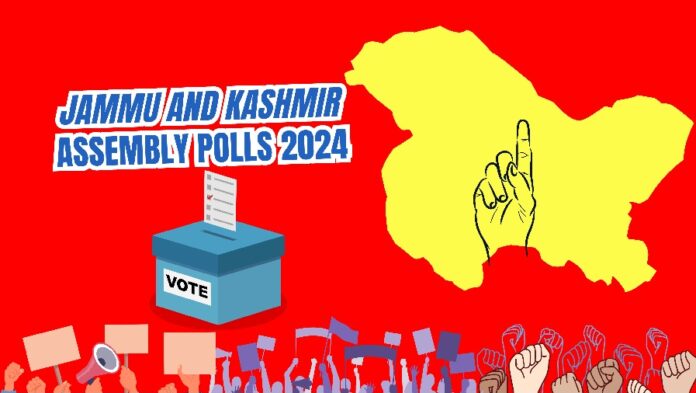The political landscape of Jammu and Kashmir (J&K) has been undergoing significant changes, especially after the abrogation of Article 370 in August 2019. This landmark decision revoked the special status granted to J&K, dividing it into two union territories: Jammu & Kashmir and Ladakh. The upcoming 2024 Assembly elections are critical because they mark the first election since this constitutional change.
Political Scenario in Jammu and Kashmir:
Key Political Parties:
- National Conference (NC): Led by Farooq Abdullah and his son Omar Abdullah, the NC has been one of the oldest and most prominent parties in the region, advocating for the autonomy of J&K.
- Peoples Democratic Party (PDP): Founded by Mufti Mohammad Sayeed, the PDP, currently led by Mehbooba Mufti, has traditionally held a strong base in the Kashmir Valley. The PDP had formed a coalition government with the BJP before 2019.
- Bharatiya Janata Party (BJP): The BJP has made significant inroads in the Jammu region and is aiming to consolidate its base in the Hindu-majority areas of the union territory.
- Indian National Congress: Although it has a reduced presence, the Congress party still holds influence in some regions, particularly in Jammu.
- Apni Party (Jammu Kashmir Apni Party – JKAP): This is a relatively new political entity formed by Altaf Bukhari, which seeks to present itself as an alternative to traditional parties like NC and PDP.
- Gupkar Alliance (People’s Alliance for Gupkar Declaration): This coalition includes NC, PDP, and other regional parties united in their demand for the restoration of J&K’s special status.
Key Issues:
- Restoration of Special Status: The NC and PDP, along with other regional parties, have been vocal about the restoration of Article 370. The BJP, on the other hand, firmly supports its abrogation, arguing that it has integrated J&K more fully with the rest of India.
- Security: Given J&K’s history of insurgency, security remains a top concern. Peace and stability in the region have been emphasized, with the BJP focusing on developmental projects and reducing militancy.
- Development: There has been a renewed focus on infrastructure, jobs, and tourism in the region. The central government has introduced various initiatives aimed at boosting economic activity.
- Kashmiri Pandit Rehabilitation: The rehabilitation and resettlement of Kashmiri Pandits, who were displaced in the 1990s, remain a significant issue. Different parties have different approaches to handling this sensitive matter.
Election and Constituencies:
The J&K Assembly has 90 seats, and the election results will determine the distribution of power between Jammu, which has a Hindu-majority population, and Kashmir Valley, which has a Muslim-majority. Some of the key constituencies include:
- Srinagar (Capital of J&K): Often regarded as the political heart of the Kashmir Valley. Parties like NC and PDP have a stronghold here, though BJP is trying to increase its influence.
- Anantnag: A PDP stronghold in South Kashmir, Anantnag has witnessed both political and militant activity.
- Jammu: The BJP has a strong base in this region, especially among the Hindu voters, and seeks to further consolidate its influence.
- Baramulla: A key constituency in North Kashmir, this area has been contested fiercely between regional parties like NC and PDP.
Election Phases and Polling Dates:
Phase 1:
Polling Date: 25th September 2024
Voter Turnout: 61.41%
This phase covered 30 constituencies, mostly from the Jammu region and some parts of Kashmir. The voter turnout was robust, especially in Jammu, where voters showed high engagement due to the BJP’s strong presence.
Phase 2:
Polling Date: 30th September 2024
Voter Turnout: 55.3%
In this phase, voting took place in 25 constituencies, including some politically significant seats in the Kashmir Valley. Voter turnout was moderate but reflected continued engagement in the democratic process.
Phase 3 (Ongoing):
Polling Date: 5th October 2024
This final phase involves the remaining 35 constituencies, with a mix of both rural and urban areas in Jammu and Kashmir. Authorities expect a turnout similar to earlier phases, with stringent security in place to ensure peaceful voting.
Result Date:
Counting of Votes and Result Announcement: 15th October 2024
After the conclusion of the third phase, counting will begin, and results will be declared, determining the political future of Jammu & Kashmir.
This election will mark the first legislative assembly to be formed after the abrogation of Article 370, which had previously granted special status to the region. The voting process has seen good engagement, particularly in Jammu, where the BJP has a strong base, while the Kashmir Valley has shown more cautious participation due to political uncertainties.



















































